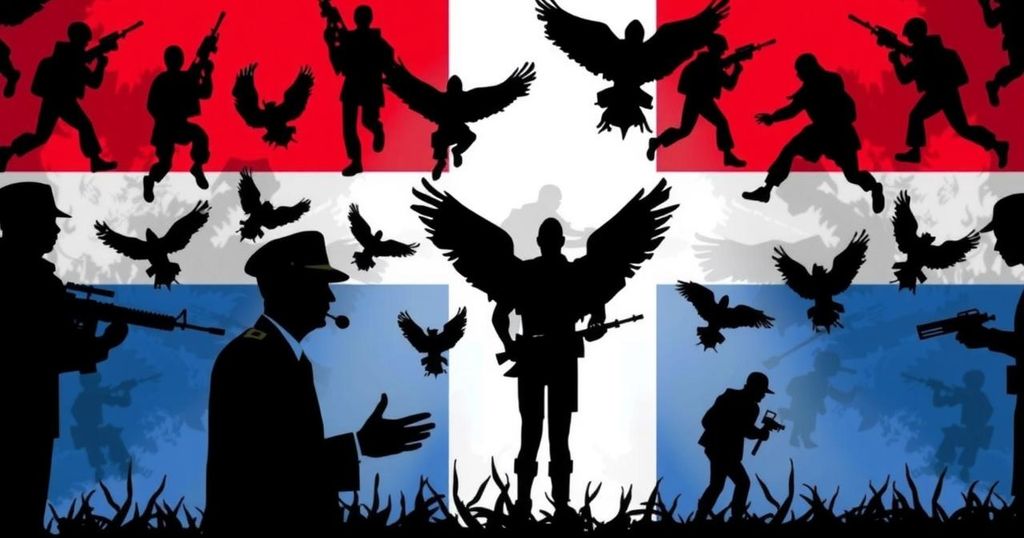Dominican President Warns of Severe Actions If Haiti Gang Mission Fails
Dominican President Luis Abinader warned of “drastic measures” to protect his country if a U.N.-backed mission in Haiti fails. With gangs controlling 80% of Port-au-Prince and escalating violence causing humanitarian crises and pressure on Dominican resources, Abinader emphasized the need for a fully established mission for securing free elections in Haiti, highlighting the implications for both nations’ security and stability.
In a recent address at the United Nations General Assembly in New York, the President of the Dominican Republic, Luis Abinader, expressed grave concerns regarding the escalating gang violence in Haiti. He warned of potential “drastic measures” that his administration might undertake to safeguard the Dominican Republic should the current U.N.-backed mission in Haiti prove unsuccessful. The mission, primarily led by Kenya with support from Jamaica and Belize, currently comprises fewer resources than needed, with approximately 400 police officers deployed, falling short of the 2,500 personnel initially promised by various nations. Abinader outlined the dire situation in Haiti, where gangs reportedly control 80% of Port-au-Prince, exacerbated by the assassination of President Jovenel Moïse in July 2021. This rampant violence has driven nearly 700,000 Haitians into homelessness, with many seeking refuge in the Dominican Republic, which shares the island of Hispaniola with Haiti. He noted that the instability in Haiti has exerted considerable pressure on Dominican security, arguing that his government has borne a substantial burden in addressing the crisis. The president highlighted the urgency of establishing a fully operational mission capable of ensuring free and transparent elections in Haiti, as the nation has not conducted elections since 2016. Currently, there is a transitional presidential council mandated to facilitate elections by February 2026. However, Abinader expressed skepticism about the current mission’s effectiveness, stating, “Practically one year from the holding of elections, the conditions are still not in place to do so.” Furthermore, he mentioned that the recent surge in violent attacks perpetrated by gangs, which included raids on police stations and assaults on critical infrastructure, has created an environment where Haiti’s collapse seems imminent. This turmoil prompted the resignation of former Prime Minister Ariel Henry and the establishment of the transitional council. The Dominican president also conveyed the significant demographic implications of the situation, noting that Haitian nationals represent a substantial part of the country’s social systems, such as education and healthcare. He emphasized, “The crisis in Haiti warrants particular attention… We cannot do it alone.” With regard to immigration enforcement, Abinader’s administration has deported over 170,000 individuals suspected of being of Haitian descent, though this figure is disputed by humanitarian organizations. Despite criticism from human rights activists regarding alleged violations against Haitians and their descendants, Abinader has steadfastly defended his administration’s commitment to safeguarding human rights. He concluded his speech by touting the Dominican Republic’s improved socio-economic indicators, including a historic low poverty rate and a decline in the murder rate. The president of Haiti’s transitional presidential council, Edgard Leblanc Fils, is expected to address the General Assembly on the following day, wherein responses to these pressing concerns may be articulated.
The Dominican Republic shares the island of Hispaniola with Haiti and has been significantly affected by the rampant gang violence in its neighbor. This violence has escalated following the assassination of Haitian President Jovenel Moïse in 2021, leading to a humanitarian crisis where many Haitians have been displaced, seeking refuge in the Dominican Republic. The situation has also caused strain on the Dominican Republic’s resources and public services, as demonstrated by the high percentage of Haitian migrants in their healthcare and education systems. Given these factors, any foreign intervention, such as a U.N. mission, has crucial implications for both nations involved. President Abinader’s recent warnings and calls for urgent action underscore the precarious nature of the security situation in Haiti and its direct repercussions for the Dominican Republic.
President Luis Abinader’s warning regarding the potential for drastic measures in response to the failure of an international mission in Haiti underscores the critical nature of the current situation. The escalating gang violence, which has resulted in significant instability and humanitarian crises in Haiti, poses a serious risk not only to Haitian citizens but also to the Dominican Republic. The need for effective international cooperation and a fully operational mission is urgent, as Abinader calls for action to avert potential collapse in Haiti and its ensuing consequences. With ongoing demographic and socio-economic challenges, the Dominican government remains committed to addressing these issues while emphasizing the importance of protecting human rights.
Original Source: apnews.com




Post Comment